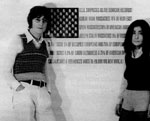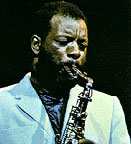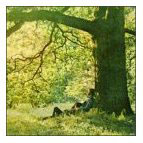|
|
The Bitterest PiL You'll Have to Swallow
|

| Yoko Ono released her Plastic
Ono Band record in 1970 to considerable less fanfare than her husband's album of the same name. Its cover is almost identical to John's album, except in Yoko's version she's laying in John's lap rather than vice versa and the back cover has a picture of Yoko as a young child instead of John. Similar too are the musicians who play on both albums. With the exception of one cut with Ornette Coleman's quartet, it's the same basic line up as on John's album: Klaus Voorman on bass, Ringo on drums and John on guitar backing Yoko on vocals. Both albums were heavily influenced by John and Yoko's exposure to Janov's Primal Scream therapy as well. Beyond these things however, the similarities end. Because John's album, though undeniably great, is still a conventional album of songs that falls within the confines of pop/rock despite the unusual rawness and honesty in lyrics and delivery. Yoko's Plastic
Ono Band on the other hand sounds other worldly and among many other things like No-Wave 9 years ahead of the curve. In fact in places it sounds like PiL, No Wave, and maybe some off shoot of downtempo that I wouldn't know the name of. In other words it anticipates a lot of music that would be considered advanced and revolutionary a good 10 to 20 years down the line from this album's 1970 release. And yet despite all of this the album remains unique and unclassifiable as anything other than Yoko.
So before I go any further in my description of the album let me clarify where I stand in regards to Yoko Ono. This is important because she tends to have such a polarizing influence on people: the whole you either love her or hate her thing. And I want to make clear that I fall in neither camp. Both sides are too simplistic in their attempts to define an individual who, at the very least, we can agree is intelligent and complex. I imagine that she may indeed be as manipulative, cold, and opportunist as her harshest critics accuse. I also find some of her music and art to be derivative or, worse, hopelessly inane and trite. At the same time it's clear that much of the criticism she has received and still this day receives is based more on misplaced resentment over her supposed role in the disbanding of the Beatles, mixed with a not so subtle racial prejudice, rather than an attentive and thorough appraisal of her actual work.
I also like some of Yoko's art, both musical and visual. And it's not hard for me to see why she was an intriguing and stimulating person for John to spend his post-Beatle days with. In short, while I'm not an apologist for Yoko, or someone who thinks everything she does is genius, or that she is simply an innocent victim of her harshest critics, I do think its incredibly ignorant to dismiss her out of hand. For as often as she may have failed in her artistic aspirations there are many other instances where she steadfastly hit her mark, and in the case of this album she hit it dead center with force. All I am saying is give Yoko (specifically this album) a chance!
So back to the record or in this case the c.d. reissue (3 extra tracks and being easer to track down than the record made it a reluctant winner). 'Why' is the first song and in addition to the title displaying a fierce disregard for the obvious ammunition it offered critics the track, to simply be blunt, is fucking amazing! It charges madly out of the gate with the sound of the tape lurching to play in the middle of a take with John doing mad slides on his guitar and shouting, like an irate bull with red flag dangled before it. Yoko then enters howling the word 'why' banshee like, sounding strangely reminiscent of John Lydon's more atonal experiments in PiL. Lennon produces scratches of shards and sparks of white noise from his guitar throughout the song, in a manner that will force you to re-evaluate him as one of the progenitors of noise rock guitar almost equal to Lou and his beautiful solo on 'I heard her call my name'. And unlike some of the other outings I've heard with Yoko, here it actually sounds like she is listening to the band and interacting with them to create something organically whole, rather than just wailing without due respect to space or her accompanists. All in all 'Why' is one of the high points of the album and stands up to repeated listening: in no small part because Klaus and Ringo (more on them later) hold down such a solid up-tempo, dare I say almost funky groove, to support the inspired noise laid on top by John and Yoko. Its 5 minutes and 37 seconds that really flies and gets the blood up. |

| 'Why' is followed cheekily, as you Brits might say (you do say that right?) by 'Why Not'. Were John and Yoko closet Steve Allen fans? If you get this reference you are either very old or a fan of that clip of Kerouac on The
Steve Allen show. In any case this is as good a point as any, seeing as the song starts off with another solid beat, to talk about the drums on this album. I've had a pet theory for a while that the sound of Ringo's drums on everything from Sgt.
Pepper on as well as the supposedly simple patterns he plays (does it still qualify as simple if hardly any other drummers seem capable of doing it?) anticipated the drum sounds that developed with the advent of sampling in hip-hop in the mid 1980's. Course they were sampling old drum groove/sounds to begin with, but just go listen to any post Revolver Beatles album and see if you don't hear some of what I'm talking about. In any case, the drums sound great on this album: solid, beefy, almost as if they were stacked (the expression for sampling more than one drum sound and placing it on top of another).
A quick word too about our German friend Klaus Voorman: scratch the surface of almost any important event and you'll find a German lurking somewhere underneath; that's my variation on the old adage behind every great man is a great woman. Voorman's bass is mixed nice and high and he lays down the bottom with such rock steady force that you really notice when he introduces a variation or minor change to the groove: a lesson that many a busy bass player could learn from. Its actually downright absurd that the compositions of these songs aren't credited to all four, rather than just John and Yoko, as they are clearly improvisational in nature and Ringo and Klaus bring just as much to the mix as J&Y. I guess that's the politics baby.
'Why Not' is twice as long as 'Why' and about half as fast. Mid-tempo until the last minute, where it picks up a bit and finally fades to what sounds like a train. I would be curious to know if this is a pre-recorded sound or another case of John using his guitar to generate unconventional sounds. Yoko again proves more attentive to her accompaniment and allows space in between her vocalizing which lets the song breath and renders it as something more compelling than just difficult listening. I am at a loss to describe the vocals: lets just say it falls somewhere between a baby trying to yodel and a very odd girl's fuck noises. In the background John displays mucho moxie in his use of the guitar to produce soundscapes, mimicking many of the guttural sounds Yoko produces. At one point it almost sounds like they are trading fours between guitar and vocals.
The next cut is the other major stand out on the c.d. (and the last song on the first side of the l.p.) not in the least for its great title: 'Greenfield Morning I Pushed An Empty Baby Carriage All Over the City'. See, already you're dying to hear it. The song begins with another beguiling sound, of which I would be interested to know the true origin. It almost sounds like a loop of a viola, which could maybe be created by a guitar effect, as no other string instruments besides guitar are credited on the album. This is the aforementioned song that sounds like some modern off shoot of downtempo, or some more obscure sub-genre. The beat Ringo lays down sounds shockingly similar to drums that have been manipulated: recordings cut up by modern equipment, it could be the drum track backwards. Yoko vocally utilizes a faux-Arabic style while playing with a delay effect on her voice that renders strange harmonies. It brings to mind the My
Life in the Bush of Ghosts record by Eno and Byrne (a good thing in my book). The song fades to the sound of birds tweeting softly. And here I should mention the advantage of owning this on record as opposed to c.d.. It occurs to me when listening that broken into two sides this record plays out much more beautifully; this song bringing side one gently to a close. Although the whole thing can almost qualify as a pleasant listen, particularly the track just described, it is a little much to be immediately plunged into the second side, which is overall slightly weaker than the first. The separation of sides would render this album even more compelling.
|

|
Side two begins with AOS. This is the collaboration
with Ornette Coleman's band actually recorded two years earlier in 1968. For
the record it's Ornette along with Charlie Haden and Ed Blackwell on bass and
drums respectively with David Izenzon on bass as well. Like so many 'exciting in theory' collaborations it doesn't really deliver much of a pay off. But it's not bad, actually it's rather funny. It starts slow with Yoko, Ornette and some bowed bass, all very quietly moaning together. Yoko's moaning gradually becomes more sexual in sound: in fact her performance here is enough for us to safely conclude that, if necessary, she could fake one hell of an orgasm. She states at one point 'not yet, not yet' in
a heavy moaning voice and its hard to tell if this is part of the act or an
instruction to Ornette and Co. to hold off a little bit longer. But not too
long after this there's this tremendous shift in gears that is both horrifying
and hilarious. Picture it: this girl is panting, moaning in a quiet but very
vividly sexual manner, there's a sort of Pavlov response you get, then suddenly
out of nowhere she starts shrieking in a manner that not only immediately cools
you off but makes you draw back in repulsion. Yoko's voice here reminds me
of an exaggerated take on the hideous noise made by one of those nasty black
birds called Grackles. Things eventually cool off again and the song returns
to quiet cooing for the last couple of minutes.
The next track is called 'Touch Me' and it's some hot shit, musically at least. Vocally Yoko appears to have reached an impasse in which she has already fully explored her bag of tricks and seems to be stuck recycling variations on a theme that we've already heard in better form on earlier cuts. It's a bankruptcy of vocal ideas that reminds me again of John Lydon, in this case round about Flowers
of Romance. And like that whole album I wish for the world that I could just wipe the vocals off in order to hear more clearly the interesting music going on beneath. 'Touch Me' starts
off up-tempo and there's plenty of fevered playing from Voorman, Starr and
Lennon, including a nice drop out near the beginning that shifts the song dramatically,
into a slower spacey section. Based on the performance it's impossible to believe
that Starr and Voorman could have been less than enthusiastic about their participation
in this project, despite what we may be led to believe.
The last track on the album is called 'Paper Shoes' and it's the high light of Side Two. It starts with what seems to be the same train sound I was curious about at the end of 'Why Not'.
There's enough of it to here to make clear that its a prerecorded sound, a
train or subway car I guess. Yoko is using a delay or echo effect on her voice
again and it provides needed variation on her vocal delivery. But there are
some new vocal ideas here too: a kind of whooping amongst the wailing, if you
will. And the wailing is more akin to singing than elsewhere. Musically the
band is going for an approximation of the subway/train noise tacked on to the
beginning of the song. They do a fine job, particularly Ringo, who keeps up
an insistent locomotive beat on his toms for the duration. John's imaginative
guitar work throughout this whole album, which completely eschews the blues/rock
idiom, makes you wish that he had done more of this type of experimentation.
Rather than describe each of the three bonus tracks, I'll just say that they're
all worth hearing at least once and one of them entitled 'Open Your Box' is
strong enough to hold up to repeated listening. Still in all I'd have to say
that if you have the opportunity to get the LP version you should go for it
over the c.d..
Inside the c.d. reissue (Rykodisc) there is a reproduction of the original
LP label, which reads on both sides 'Play in the Dark'. I have yet to try this
but it sounds like a good idea. If I sound evangelical about this record it's
because I am. This is not simply a curiosity or half assed indulgence like Two
Virgins, the Wedding Album and Life with the Lions. You really need to
hear the Plastic Ono Band, so get it in whatever format is easiest to acquire.
©
2003 William Crain 2003
|